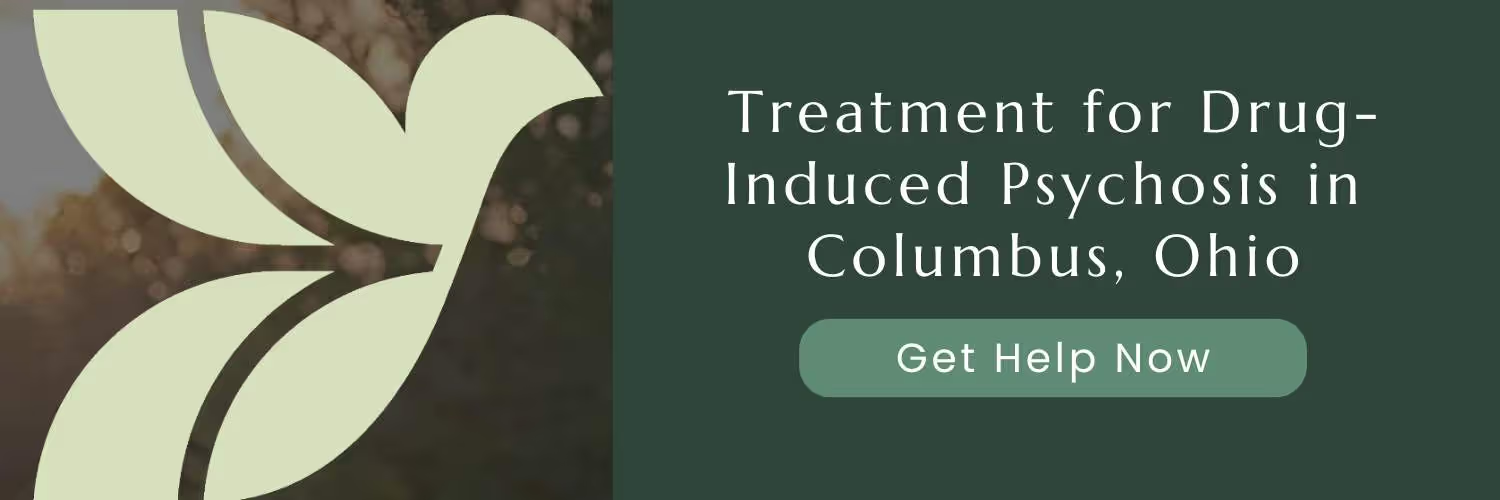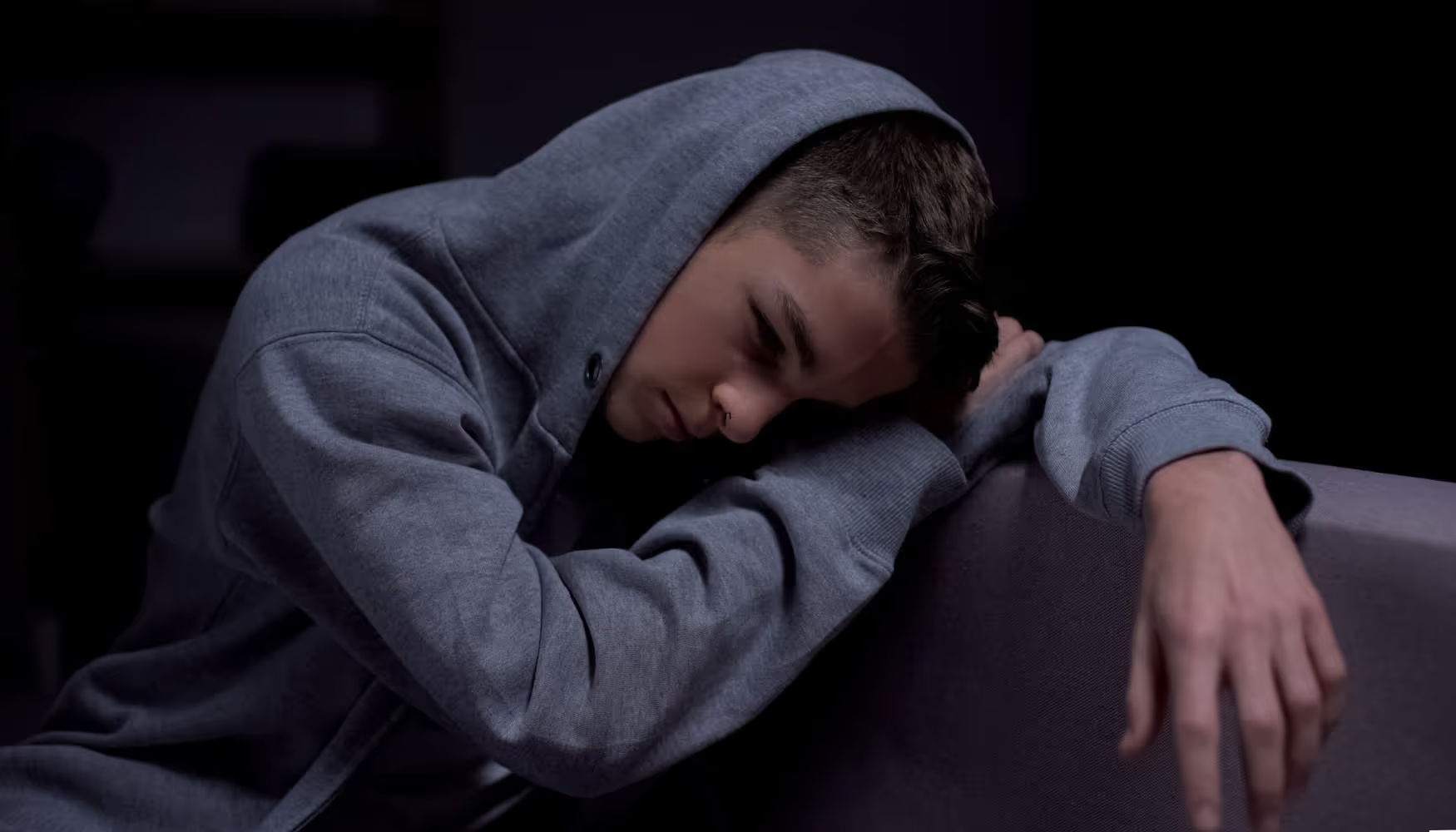Drug-Induced Psychosis: When Drugs Take More Than You Bargained For

The world is moving at warp speed. You feel like bugs are trying to crawl out of your skin, and invisible voices are telling you to do things. And when it’s all over and you’re back to earth, you can’t remember a single thing. But your friends are scared, and your family’s not sure what’s happening.
You just experienced a break from reality caused by that new drug you tried. And you don’t understand any of it — but you know it wasn’t good.
Well, now it’s time to learn what happened and why.
Learn about drug-induced psychosis, signs and symptoms, and where to find professional help.
Table of Contents
- What Is Drug-Induced Psychosis?
- Signs and Symptoms of Psychosis Induced by Four Common Drug Types
- How Do Drugs Induce Psychosis?
- Treatment for a Drug-Induced Psychosis
- Bounce Back From Drug-Induced Psychosis With Help From Dove Recovery
According to the DSM-5, its official name is Substance/Medication-Induced Psychotic Disorder (SIPD), and it’s defined as:
“A psychotic disorder diagnosed after an individual uses a substance (e.g. - a drug of abuse, a medication, or a toxin exposure) that leads to prominent symptoms of psychosis.”
An underlying mental health condition does not cause drug-induced psychosis (sometimes called toxic psychosis), although one may increase the likelihood of an episode happening. To be classified as SIPD, the episode must last less than a month after reaching sobriety. However, some drugs are more likely to induce a psychotic episode than others.
What Drug Is Most Likely To Induce Psychosis?
Not just one, but many drugs can induce psychosis. Stimulants, depressants, high-potency marijuana, and hallucinogens have all been clinically linked to drug-induced psychosis.
Stimulants:
- Methamphetamine
- Amphetamine
- Cocaine
- Methylphenidate
Depressants:
- Barbiturates
- Benzoiazapines
- Alcohol
Hallucinogens:
- PCP
- LSD
- Peyote
- Mushrooms
- Ketamine
If you or a loved one has experienced a drug-related psychotic episode, it is essential to find the right addiction treatment. At Dove Recovery, we specialize in a range of addiction recovery treatments.

#1: Hallucinogens
Most hallucinogens can interact with certain receptors in the brain, causing them to fire rapidly. Sensory networks overload, allowing more raw data to enter past usual filters. The default-mode network that controls your daydreams, sense of self, and noise filtering loses effectiveness.
Your brain will try to explain all the new sensations by creating hallucinations. These can sometimes be fun and exciting, but also scary and traumatizing. This distorted reality can often cause erratic behavior, resulting in dangerous impulses and risky actions. And some drug users can still see visual distortions long after the episode ends.
Symptoms of drug-induced psychosis from hallucinogens might include:
- Hallucinations
- Distorted sense of time and space
- Mixing of perceptions such as “seeing sounds” or “hearing color”
- Sense of dissociation from mind and body
- Distortion of reality
- Spiritual experiences
- Paranoia
- Panic
- Mood shifts
- Cognitive issues
#2: Stimulants
Stimulants can cause dramatic increases in the “feel-good chemicals” dopamine, serotonin, and norepinephrine. This can temporarily dismantle the brain's reality-filtering ability. Extended misuse of these drugs may lead to enduring psychiatric issues.
Symptoms of drug-induced psychosis from stimulants might include:
- Delusions
- Paranoia
- Hallucinations
- Anxiety
- Mania
- Increased aggression, violence, or hostility
- Memory problems
- Cognitive decline and difficulties concentrating
#3: Depressants
While depressants may sometimes cause psychosis under the influence, It may be more likely to happen when you’re withdrawing from them. The withdrawal may cause a rebound of certain chemicals that overwhelms the brain.
Symptoms of drug-induced psychosis from depressants might include:
- Impaired cognition
- Aggression
- Rapid mood changes
- Impaired judgment
- Perceptual distortions
- Hallucinations
- Delirium
#4: Marijuana
High levels of THC found in marijuana can prevent the brain’s ability to distinguish reality. Frequent users or those genetically more susceptible may experience a psychotic episode. Extended use, particularly during adolescence, can lead to a risk of long-term persistent psychotic illness.
Symptoms of drug-induced psychosis from marijuana might include:
- An altered perception of time
- Heightened sensory perception
- Fear
- Panic
- Paranoia
- Hallucinations
- Delusions
- Sense of losing personal identity

Not everyone who uses one of these substances above will experience a psychotic episode. And if someone does, it is unlikely they will experience the same reactions as someone else. Every brain is wired differently, and genetics play a large part in whether someone will experience psychosis.
People who have a history of mental illness or are genetically predisposed to have one like bipolar disorder or schizophrenia, have a higher risk and are more likely to experience symptoms.
Using the drugs mentioned above can often trigger the onset of mental illness — particularly mood disorders like bipolar disorder and schizophrenia — if someone is genetically vulnerable to the possibility.
Drug use does not always develop into mental health disorders. However, mental health disorders can contribute to their use. Those with mental illnesses who are not properly treated may use drugs as self-medication to ease the symptoms but instead, they exacerbate them, making them worse.
Mental illness and addiction, called co-occurring disorders, often share similar risk factors, meaning a person might have a harder time dealing with both. This can often lead to an increase in psychotic episodes with shorter intervals between episodes.
If you or a loved one is struggling with drug-induced psychosis and drug use, Dove Recovery in Columbus, Ohio, is ready to help you bounce back. Contact us today to learn more.

It is vital to determine whether the mental health disorder came first or if the psychosis followed the drug use.
If the mental health disorder predated the psychotic episode, then the substance use could be a way of self-medicating. If so, the treatment plan will differ from that of traditional detox and outpatient therapy. This plan should be personalized for strategic long-term treatment, usually including behavioral therapeutic interventions and psychiatric medication.
If the psychosis directly resulted from drug misuse, the plan should focus on managing the short-term symptoms with antipsychotic medications during detox and then starting a long-term recovery plan.
At Dove Recovery, as soon as the psychotic episode ends, the addiction treatment will begin. We offer a handful of effective treatment options, including:
Intensive Outpatient Program
Our Intensive Outpatient Program (IOP) combines intensive therapy with the flexibility of outpatient treatment. This program is designed for those in need of a more structured form of outpatient treatment, but who do not require full-time inpatient care.
IOP is the middle ground between full-time care and a more traditional outpatient treatment program. It is designed to facilitate a smooth transition from intensive care back into everyday life.
Dove Recovery’s IOP allows patients to maintain their daily routines and is a more affordable option than inpatient programs. Our patients can practice their new coping skills in real-world situations.
Partial Hospitalization Program
Our Partial Hospitalization Program (PHP) acts as the bridge between inpatient care and traditional outpatient therapy. It is designed for patients who still require intensive inpatient care, but who get to go home every night. Those who recently completed their inpatient treatment or just need more structured support often benefit the most from PHP.
Outpatient Program
The outpatient program here at Dove Recovery is a more traditional addiction treatment program. It is our most flexible option. Patients receive a personalized, part-time treatment schedule to follow that still gives them the ability to work, go to school, and spend quality time with their families.
It is designed for patients who have an excellent support system at home and are less likely to relapse. Patients can resume their day-to-day lives and responsibilities. They can use their new coping skills in real-life situations, which often aids in relapse prevention.
Detox
Our Detox and Withdrawal Management program assists patients as they transition from street drugs onto buprenorphine and naltrexone-containing medications — medications proven to aid withdrawal symptoms.
It includes one-on-one nursing care and daily individual therapy sessions. Providers will visit daily to help with any mental health or medical needs. We also offer psychiatric diagnostic testing for mental health concerns.
Individual direct care of all patients is essential in the early stages of recovery, as well as helps providers determine the correct dose for withdrawal-assisting medications.
When you are ready to take back your life and start on your journey to recovery success, we are ready with the support and resources you will need. Our compassionate care team is looking forward to helping you put drug use and psychosis behind you and step onto a new path.
Dove Recovery is a drug and alcohol rehab center in Columbus, Ohio. Our tailored addiction treatment programs cover a wide variety of substances, as well as co-occurring and substance abuse disorders. If you or a loved one is battling addiction, we’re here to get you started and continue on your recovery journey.
Call or schedule an appointment online to start your new sober life today.

